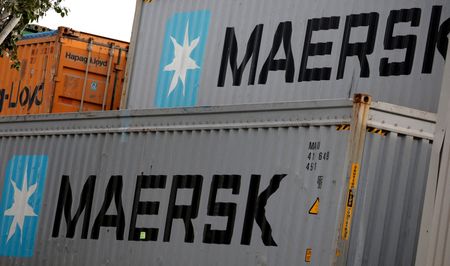COPENHAGEN (Reuters) – Denmark’s Maersk said on Thursday it has rerouted four out of five container vessels that were stuck in the Red Sea back towards the Suez Canal and the long journey around Africa to avoid the risk of attack.
Yemen-based Houthi militants recently attacked a number of vessels in the southern Red Sea, including a Maersk ship on Saturday, disrupting global trade and raising fears of a fresh bout of global inflation as shipping rates soared.
The United States on Dec. 19 launched a multinational operation to safeguard commerce in the Red Sea, but many shipping companies and cargo owners are still diverting vessels around Africa.
Maersk, which had last week briefly sought to restart Red Sea voyages after a pause, said on Tuesday its container ships would again avoid the route that gives access to the Suez Canal, a shortcut between Asia and Europe.
But five Maersk ships headed towards Asia had already traversed the canal from the north and were poised to travel south past Yemen when the pause was announced, leaving the crews and tens of thousands of containers in limbo.
The Maersk Genoa, Maersk Londrina, Ebba Maersk and Gjertrud Maersk container vessels, which had been sitting in the Red Sea just south of Saudi Arabia’s port of Jeddah in recent days, were on Thursday rerouted around the Cape of Good Hope, a Maersk schedule showed.
A fifth vessel, Maersk Utah, that had also been stuck in the area, had not yet been rerouted, but a Maersk spokesperson said it would not sail past Yemen.
Sending the ships back via the Suez Canal would incur fresh fees to pay for the passage through the canal and add significant delays and extra fuel costs for a journey around the Cape of Good Hope.
Maersk said last month it had imposed a transit disruption surcharge (TDS) and a peak season surcharge (PSS), adding a total of $700 to the cost of a standard 20-foot container travelling from China to Northern Europe.
The Suez Canal is used by roughly one-third of global container ship cargo, and re-directing ships around the southern tip of Africa is expected to cost up to $1 million extra in fuel for every round trip between Asia and Northern Europe.
(Reporting by Jacob Gronholt-Pedersen; editing by Terje Solsvik and Paul Simao)
